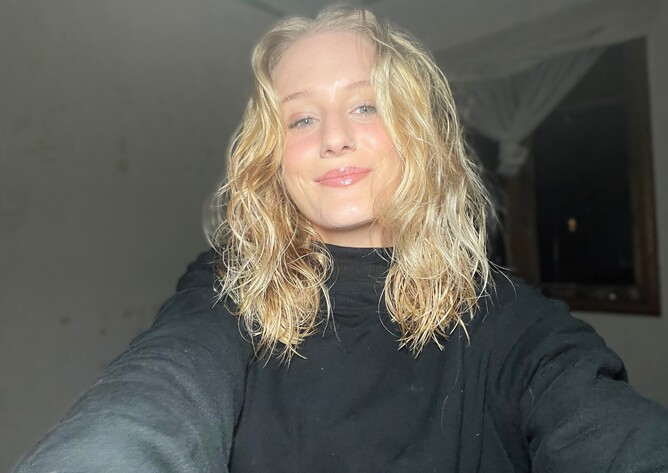Hunched over a waiting room chair in extreme agony, Tisharne Skinner didn’t think things could get much worse.
The 21-year-old was in Waikato Hospital’s emergency department, for the third time in as many months, desperate for an answer to the crippling symptoms she was experiencing from endometriosis.
Endometriosis is a chronic, incurable condition that affects about 120,000 females in New Zealand. It occurs when tissue that is similar to the lining of the uterus is found in places outside of the uterus, such as the ovaries and fallopian tubes. In severe cases, it can cause scarring, ovarian cysts and adhesions in the pelvic area. Left untreated, it can cause fertility problems.
Tisharne’s endometriosis was severe. In just 10 months she had accrued 23 hospital visits, multiple internal and external ultrasounds and overnight stays, not to mention several routine GP appointments to get to the bottom of her pain. Crushingly, almost all visits saw her discharged home and told this was all “part of being a woman.”
“Basically, it was back-to-back visits each time I had my period,” Tisharne says. “Each time, the pain was immense, like nothing I can describe. Each visit to a doctor or the hospital they’d just say it was normal, part of being a woman, and give me a prescription for pain medication.”
Tisharne’s first inkling something wasn’t right was just over a year ago, after she came off birth control.
“The first period I had was excruciating and with each one after that, the pain just seemed to get worse.”
One of the first lines of treatment for endometriosis is birth control, which works to reduce oestrogen, slowing down the growth of endometrial tissue which can help with pain relief.
But for Tisharne, birth control wasn’t an option. “I was extremely depressed when I was on it, which is part of the reason I came off it in the first place, and my partner and I had been talking about wanting to have a baby, so I wasn’t prepared to go down that route.”
Instead Tisharne was prescribed strong painkillers, but these also came with severe side effects including constipation and low blood pressure – which also prompted another emergency visit.
“I basically passed out in the waiting room from the combined effects of the painkillers, endo symptoms and a reaction to the laxatives I had been prescribed for constipation.”
Tisharne was referred to the gynaecology unit at Waikato Hospital but was told the waiting time for an initial consultation would be three years.
“I just broke down at that point,” she says. “I felt so incredibly dismissed and like what I was going through didn’t matter. I was being told that because I wouldn’t go on birth control or heavy pain medication, even with all the side effects, that I wasn’t helping myself. Like it was all somehow my fault.”
From there, a chance Google search led her to Hamilton gynaecologist Dr. Jose Roman.
Unable to work and relying on a sickness benefit, Tisharne didn’t have the immediate funds available to pay for private treatment.
“To be honest, I didn’t even know what I was going to do after the consultation – I just knew I had to try something. I budgeted hard to get the money together to see Dr Roman and just vowed to take it step by step.”
After meeting Dr Roman, Tisharne says that for once, she felt seen. “Dr Roman took one look at me and knew what I was experiencing. To have that validation, finally, was a relief. I wasn’t going crazy, and this wasn’t just part of ‘being a woman.’”
Dr Roman recommended surgery, and quickly. “I just said, straight up, I can’t afford that. That’s when he mentioned Braemar Charitable Trust.”
He told Tisharne she would likely be a candidate for the Trust’s community surgery programme, where surgeons and anaesthetists provide free surgeries and procedures to eligible patients. These patients are people unable to access timely care via the public system and don’t have health insurance or ACC cover, or the financial means to pay privately.
“I walked out of his office and literally collapsed to my knees in tears of relief. To be told this would happen, that I would be getting a surgery that would help…I was speechless.”
Tisharne’s surgery was scheduled for three months later and took place during the Trust’s community surgery day in September 2025, where Braemar Hospital opened its theatres on a Saturday to help 32 eligible patients with free surgeries and health interventions.
During surgery, Dr Roman removed significant endometrial tissue from Tisharne’s uterus, fallopian tubes and bowel and two large ovarian cysts, as well as adhesions that had attached her bowel to her fallopian tubes.
“He said if I had waited for surgery any longer, I would have been looking at a full hysterectomy.”
Tisharne says her experience at Braemar Hospital was incredible.
“I actually enjoyed the process – imagine that! I’ve never felt so calm and happy. The doctors, nurses, everyone there made me feel welcome and cared for.”
A month on from her surgery and Tisharne says she can finally make plans for a future. She knows there is a chance her endometriosis will return, but with a plan in place with Dr Roman she’s looking forward to having children one day.
“I’ve had no pain since the surgery, which has just been incredible, and I’m excited to start thinking about starting a family.”
